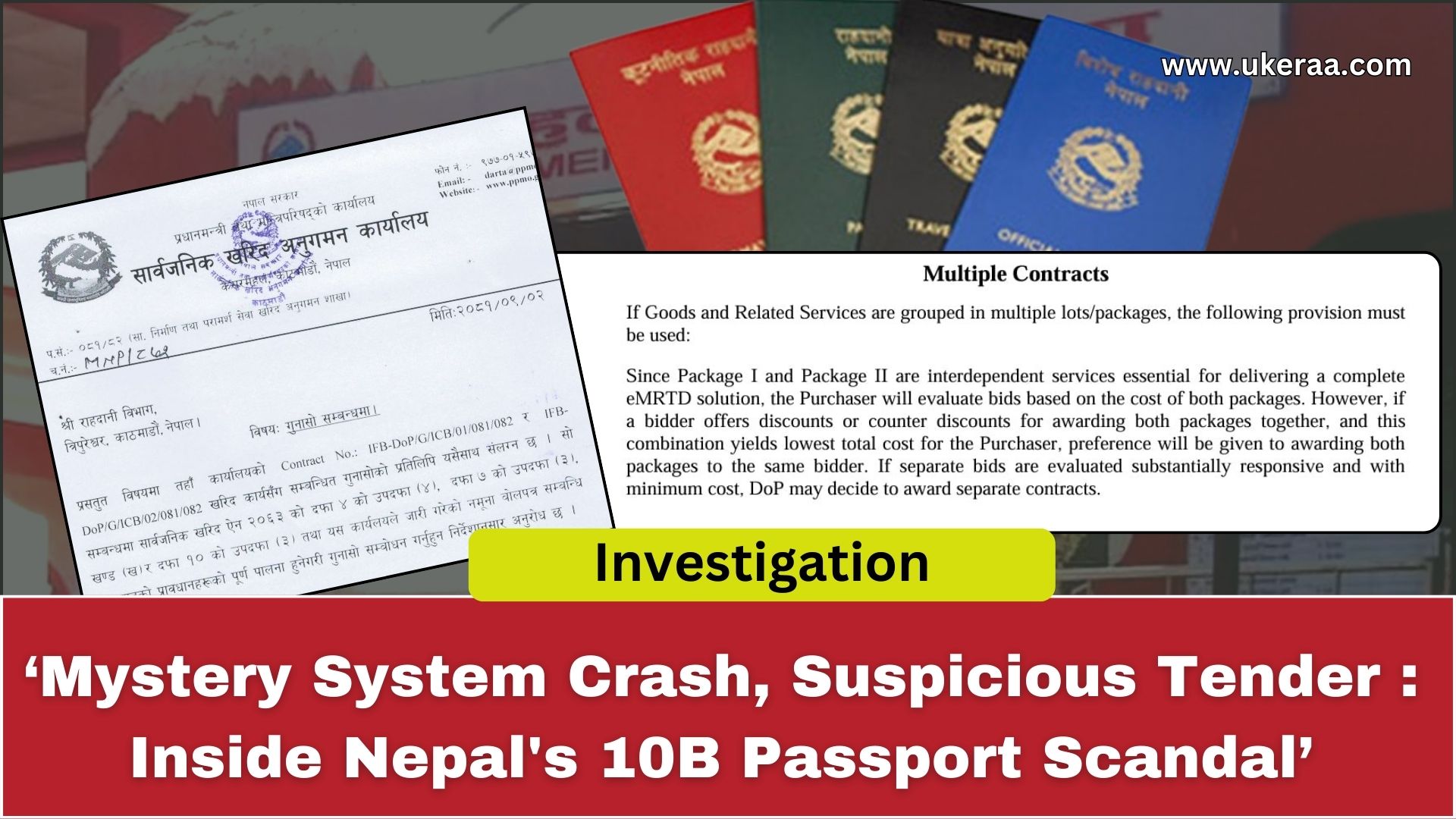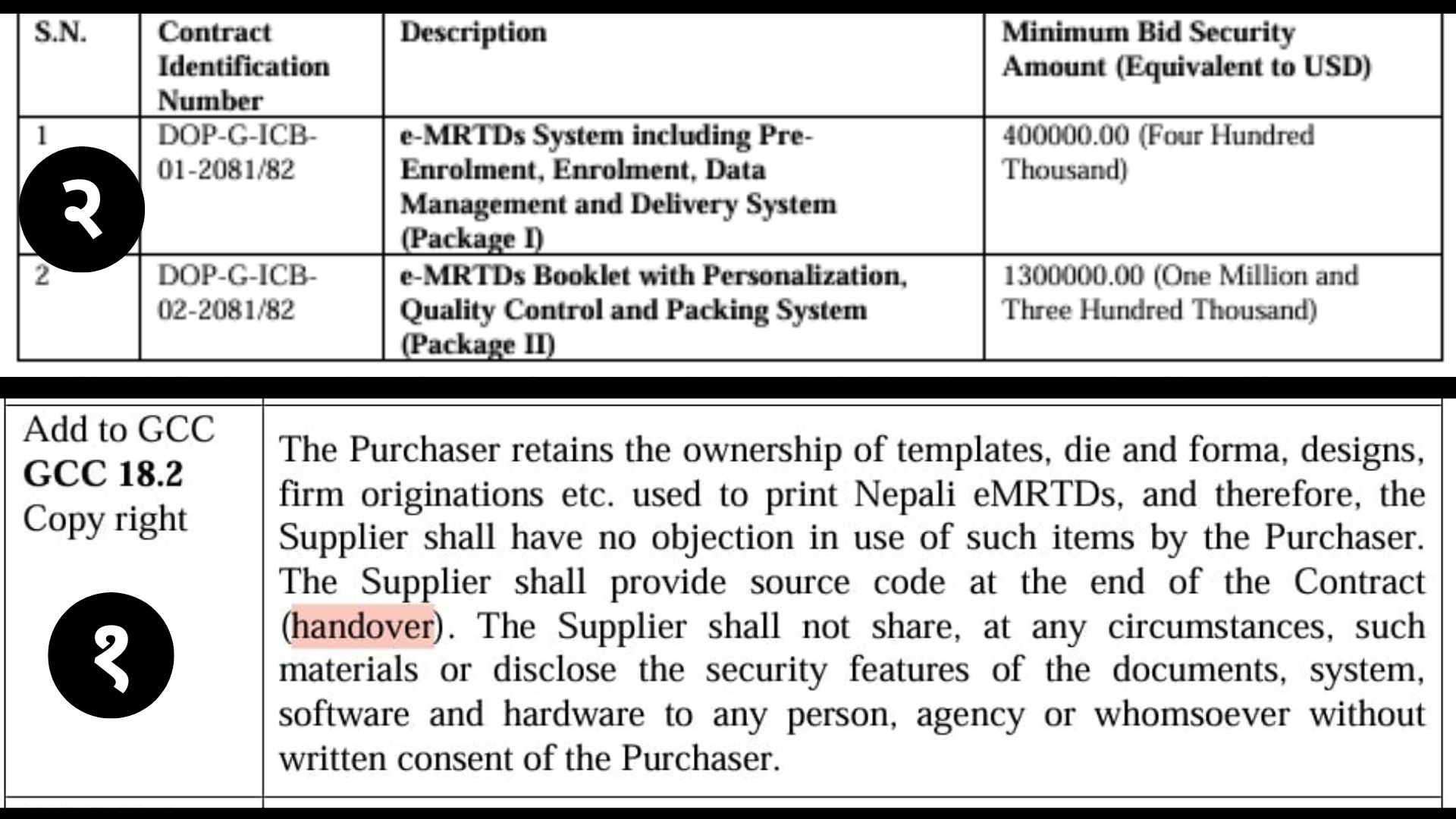Investigation: Nepal's 10 Billion Rupee E-Passport Deal Raises Red Flags

KATHMANDU : A special investigation has revealed potential manipulation in Nepal's new e-passport tender process, worth approximately 10 billion rupees ($75 million).
The Department of Passports' recent tender for 6.4 million e-passports has come under scrutiny for conditions that appear to favor the incumbent contractor.
The investigation uncovered that the Department plans to spend an additional 2 billion rupees on source code and software that should have been transferred to the government under the previous contract.
According to the existing agreement with IDEMIA Identity and Security of France, all software, templates, and source code were to be handed over to Nepal's government upon contract completion.
The tender process, while officially split into two parts, includes provisions that effectively combine them into a single package. The first component, valued at 2 billion rupees, covers pre-enrollment, enrollment, data management, and delivery systems. The second, worth 8 billion rupees, encompasses booklet production, personalization, quality control, and packing.
A special discount provision allows a single company to win both contracts if they offer the lowest combined price, effectively disadvantaging new competitors.
IDEMIA Identity and Security, which has maintained control of Nepal's passport contracts for 14 years, appears to have a significant advantage in the bidding process. The company already possesses the software infrastructure, allowing them to bid at lower costs, while new competitors would need to invest approximately 2 billion rupees to develop new systems.
Department officials have been unable to explain why they aren't enforcing the existing contract's software transfer provisions.
 The investigation also revealed troubling security incidents. The e-passport system experienced unexpected disruptions in November 2024, with the Department claiming a cyber attack affected computers containing sensitive biometric data.
The investigation also revealed troubling security incidents. The e-passport system experienced unexpected disruptions in November 2024, with the Department claiming a cyber attack affected computers containing sensitive biometric data.
Despite the severity of the alleged breach, no formal investigation was requested from Nepal Police's Cyber Bureau. The system mysteriously resumed operation after the new tender was announced.
During pre-bid meetings, potential competitors voiced strong opposition to the tender conditions. Representatives demanded removal of provisions favoring the incumbent, and the Public Procurement Monitoring Office issued warnings about the tender conditions.
When questioned, Department Director General Tirtha Raj Aryal has been unable to provide clear justifications for the tender structure.
The current situation follows a pattern of contract extensions with IDEMIA. The original 2020 contract for 2 million e-passports was worth 2.48 billion rupees. Through various modifications, IDEMIA received additional orders for 2.8 million passports. In June 2023, the cabinet approved further extensions, citing potential passport shortages.
When questioned about the need to purchase new software systems instead of utilizing the existing contract's transfer provisions, Director General Aryal claimed that a 'deal' with the current company had failed, but could not provide details about the nature of this deal or why it was necessary given the existing contract terms.
Department spokesperson Kirankumar Gurung attempted to justify the new software purchase by claiming that the existing software wouldn't work with new hardware, an explanation that industry experts have questioned.
The investigation has raised significant concerns about the transparency of Nepal's passport procurement process. Industry experts suggest the tender conditions and recent system disruptions indicate a coordinated effort to maintain IDEMIA's control over Nepal's passport production system, potentially at significant cost to taxpayers. The department's silence on investigating the system disruption incident, combined with the tender process emerging in a way that favors the French company, suggests the system disruption wasn't merely a technical problem but potentially part of a larger pattern of contract manipulation.
पुष १५, २०८१ सोमबार १६:४६:५० मा प्रकाशित
उकेरामा प्रकाशित सामाग्रीबारे प्रतिक्रिया, सल्लाह, सुझाव र कुनै सामाग्री भए [email protected] मा पठाउनु होला।










